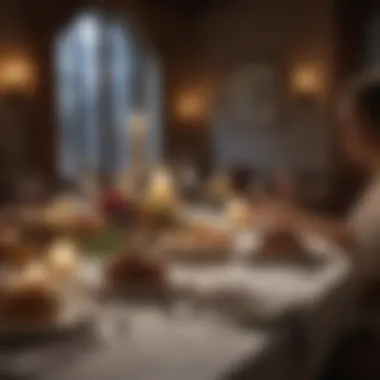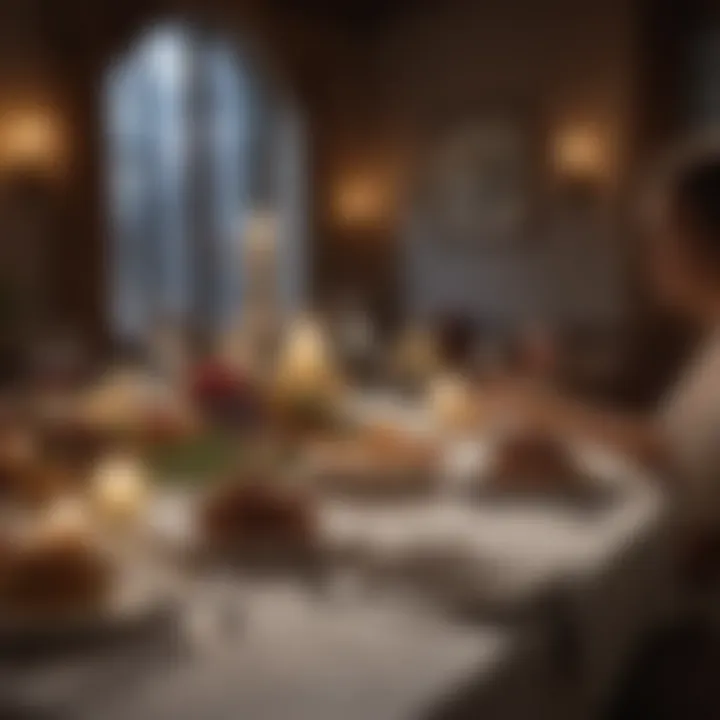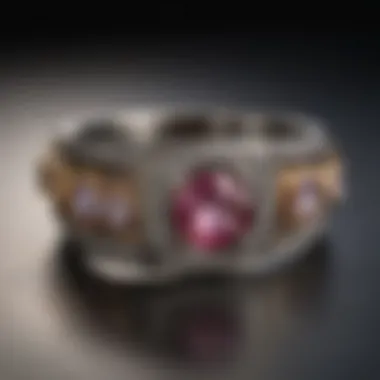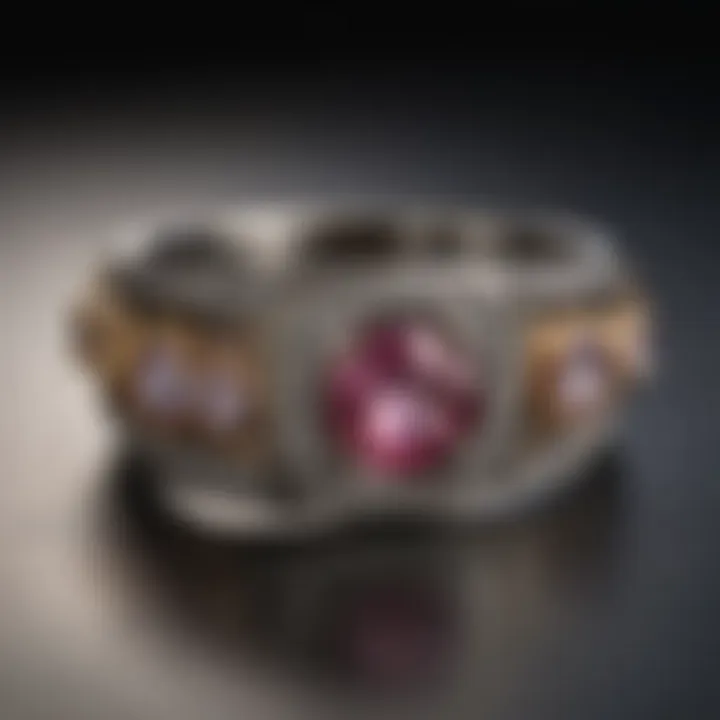Thoughtful Wedding Gift Ideas for Your Spouse


Intro
Selecting a wedding gift for your spouse is not merely a task; it involves a deep understanding of their personality and preferences. A carefully chosen gift can epitomize love and mutual respect. With numerous options available, navigating through them can seem daunting. However, couples will find that prioritizing thoughtfulness over monetary value is the essential strategy in this endeavor.
Consider that such gifts not only serve as tokens of affection but also enhance the emotional connection within the marriage. This essay will illuminate various options, enabling people to choose gifts that resonate with their unique bond.
Understanding the Importance of Wedding Gifts
The act of giving gifts plays a central role in many human cultures. It helps express affection, gratitude, and the intention to forge deeper connections. In the context of a wedding, gifts take on a particular significance. They are not just items exchanged; they symbolize the start of a new journey together. Choosing the right gift for a spouse can evoke strong emotional responses and enhance the bond created on that significant day.
Symbolism of Gift-Giving
Wedding gifts serve as a tangible representation of love and commitment. They mark the celebration of a union, highlighting promises made between partners. A well-chosen gift can reflect shared experiences, inside jokes, or cherished memories. This element of personalization can turn a simple item into a treasure that holds deep sentimental value. For instance, a piece of jewelry may symbolize not only beauty but also the enduring nature of a relationship. Whenever the recipient wears it, it can evoke feelings associated with the love and commitment shared.
Moreover, gift-giving reinforces social ties, both for the couple and their families. When friends and family participate in this practice, it underscores community support. It shows that loved ones recognize and affirm the importance of the couple's relationship.
Cultural Perspectives on Wedding Gifts
Exploring different cultural perspectives on wedding gifts illuminates how diverse societies approach this topic. Each culture has its traditions and customs that shape the significance and type of gifts exchanged. In some cultures, monetary gifts are preferred, providing a means for newlyweds to start their lives together. In other cultures, handcrafted items or family heirlooms are valued largely for their historical significance.
For example, in many Western cultures, gifts may lean towards practical household items or luxurious experiences. In contrast, certain Eastern traditions may incorporate symbolic gifts designed to bring good luck and prosperity.
This varied landscape of gift-giving showcases the richness of human expression surrounding weddings. It highlights that while the underlying sentiment may be universal, the form those offerings take is influenced by unique cultural narratives.
"Understand the intricacies of cultural backgrounds to choose a gift that holds both meaning and significance for your spouse."
As couples navigate these traditions, they can thoughtfully approach gift selection. This understanding ensures that the gifts they choose resonate not only with their personal tastes but also with cultural contexts.
Evaluating the Preferences of Your Spouse
Understanding your spouse's preferences is pivotal when selecting a wedding gift. It goes beyond just picking something off the shelf; it involves a thoughtful consideration of their interests, likes, and emotional ties. By investing time in evaluating these factors, you create a meaningful connection with the gift itself. This article section will guide you to focus on important elements to identify what can truly resonate with your spouse.
Assessing Personal Interests and Hobbies
Start by delving into the personal interests and hobbies of your spouse. This can offer insight into what they enjoy most. Identify their favorite activities, whether it is traveling, cooking, gardening, or reading. Each unique interest can inform your choice.
- Inquiries and Observations: Start informal conversations about their recent interests or ask questions about their feelings on various activities. Simple, direct inquiries can be revealing.
- Past Gifts: Reflect on gifts they have appreciated in the past. Analyzing prior reactions can help inform what they value and enjoy.
- Hobby-Related Gifts: If your spouse enjoys cooking, consider items that relate to culinary experiences, such as a cooking class or high-quality kitchen tools.
Supporting their hobbies with a thoughtful gift is likely to be well-received and appreciated.
Understanding Emotional Connections
Recognizing the emotional context of gift-giving is crucial. Gifts are not merely commodities; they can serve as symbols of connections and shared experiences. Here are some vital aspects to contemplate:
- Shared Memories: Consider gifts that evoke shared memories. A framed photo of an important event could serve as a wise choice. It reinforces shared experiences.
- Personal Sentiments: Think about how certain gifts may affect your spouse emotionally. The intention behind the gift often carries more weight than the gift itself.
- Sentimental Value: Items with sentimental value can deepen emotional connections. This might include family heirlooms or personalized items that reflect shared goals or dreams.
"Thoughtful gifts ultimately strengthen bonds, reflecting genuine appreciation and understanding."
In essence, melding personal interests and emotional connections can create a profound wedding gift that resonates with your spouse. Evaluating these elements enriches the experience of gift-giving, bridging the gap between mere objects and cherished memories.
Traditional Wedding Gift Ideas
Traditional wedding gifts carry significant weight in numerous cultures. These gifts often symbolize love, commitment, and shared life goals. Presenting a spouse with a classic gift can reaffirm emotional bonds and serve as a cherished memory. Traditional gifts are not just items; they encapsulate the essence of the relationship and the moments shared together.


Choosing traditional wedding gifts can also be seen as a gesture of respect towards the history and cultural significance they embody. Many people find comfort in these time-honored selections. They often evoke nostalgia and highlight the importance of unity.
Classic Jewelry Selections
Jewelry is perhaps the most prominent traditional wedding gift. Rings, necklaces, bracelets, and earrings possess intrinsic value and often become treasured heirlooms. The act of gifting jewelry symbolizes commitment and deep affection.
Rings, particularly, hold considerable importance. While wedding bands signify the union itself, engagement rings serve as a promise of love and fidelity. Choosing a piece that reflects the spouse’s style is essential. This could be a simple band or something adorned with precious gemstones. Each piece tells a story, a narrative that is personal and enduring.
Necklaces and bracelets can also convey thoughtfulness. A pendant that holds a special meaning or a bracelet that complements a partner's everyday wear can make a profound statement about the relationship. Such gifts are often appreciated for their aesthetic value as well as their emotional significance.
Additionally, consider presentation. How the jewelry is packaged and presented can enhance the overall experience. An elegant box or a thoughtful note can transform a simple gift into a memorable moment. In this way, classic jewelry selections not only serve as a physical gift but also as tangible expressions of one’s commitment.
Time-Honored Keepsakes
Keepsakes are traditional gifts that uphold sentimental value. These items often carry rich stories and history. Gifting a keepsake means investing in the emotional fabric of the relationship. Some examples include engraved items, photo albums, or family heirlooms.
Engraved Items, such as keychains or watch backs, provide a personal touch. They can feature significant dates, initials, or short messages that deepen their meaning. This customization aligns the gift with personal memories, creating a one-of-a-kind present.
Photo Albums are another way to celebrate milestones. Curating memorable moments into a beautifully designed album can serve as a reflection of the couple’s journey together. It presents an opportunity to revisit fond memories at any time and strengthens emotional ties.
Moreover, family heirlooms are gifts with deep-rooted significance. Passing down items from previous generations symbolizes legacy and values shared through time. Such gifts often evoke strong feelings of love and connection.
Modern Approaches to Wedding Gifts
In the evolving landscape of gift-giving, modern approaches offer innovative ways to express affection. These methods break from the traditional norms, encouraging personalized experiences over mere material possessions. Such gifts can strengthen the emotional ties between spouses, providing shared moments that may carry deeper significance. Embracing modern approaches helps to highlight individual interests, making gifts more meaningful. This section explores two primary categories: experiential gift ideas and customized gifts, both offering unique advantages.
Experiential Gift Ideas
Experiential gifts focus on shared experiences rather than physical items. This approach can enhance the bond between spouses through memorable activities together.
Travel and Adventure Experiences
Travel and adventure experiences stand out as a powerful way to create lasting memories. Choosing to explore new places or participate in thrilling activities can add excitement to the relationship. The key characteristic of these experiences is their shared nature; they require both partners to engage fully, deepening their connection. For instance, a surprise weekend trip can be both invigorating and intimate.
Advantages include creating moments that can be cherished for years, fostering teamwork, and promoting exploration of new interests. Disadvantages could involve cost, potential logistical challenges, or differing preferences for locations and activities.
Classes and Workshops
Participating in classes or workshops can enrich a couple's skills together. Whether cooking, painting, or dancing, these activities promote cooperation and laughter. A key characteristic is that they often allow for hands-on engagement. This involvement makes the learning process enjoyable and memorable.
Classes can serve various interests, offering the couple a chance to bond over shared learning experiences. The advantage of this approach is that it not only helps in skill development but also nurtures a sense of teamwork. However, some may find certain class formats less appealing or time-consuming.
Concerts and Shows
Attending concerts and shows provides couples with a dynamic way to enjoy shared interests in music or theater. This gift type is based on the couple's appreciation for live performances. The energizing atmosphere of such events can invigorate relationships, creating feelings of joy and excitement.
One unique feature is the shared emotional experience; seeing a favorite band or play together can become a cherished memory. However, tickets can be costly, and preferences in music or performance styles can vary significantly.
Customized Gifts
Customized gifts allow for deeper personalization and thoughtfulness, offering options that reflect the recipient's unique preferences.
Engraved Items
Engraved items hold significant sentimental value. This personalization indicates care and consideration, often transforming ordinary gifts into cherished mementos. The key characteristic of engraved items is the personal touch that reflects individual love. For example, a set of cufflinks or a watch with initials can serve as a reminder of the bond. Advantages include the emotional connection created through personalization. However, selecting the right item for engraving can be a challenge, as it may not suit every person's taste.
Personalized Art
Personalized art can capture important moments or represent shared passions. This type of gift can range from custom portraits to artwork depicting significant events in the couple’s journey. The key characteristic of personalized art is its uniqueness; no two pieces will ever be the same, creating a special touch. Such gifts can also add a distinctive flair to home decor, contributing to the couple's aesthetic preference. The advantage is that personalized art often serves as a conversation starter, bringing joy to both partners. A potential disadvantage is the time investment required for the artist to create something tailored, which could be a drawback if time is limited.
Custom-made Home Decor


Custom-made home decor can reflect the couple's shared tastes and style. Tailoring pieces like pillows, wall art, or furniture to fit a specific vision allows for a unique interior atmosphere. The key characteristic here lies in the collaborative aspect, as selecting or designing decor can be a bonding activity. The advantage of this gift is that it can help create a living space that feels truly personal. However, the process can involve considerable decision-making, which might pose challenges for couples with different ideas about home aesthetics.
Budget Considerations for Wedding Gifts
Setting a budget is a crucial part of selecting the right wedding gift. When considering gifts for a spouse, one must be mindful of financial limits while also aiming to find something meaningful. A well-thought-out budget ensures that the gift continues to be a source of joy rather than stress. It helps prevent overspending, which can lead to financial strain in a marriage, especially when combined with other expenses related to the wedding itself.
Creating a budget also simplifies the decision-making process, allowing for wider exploration of options that fit within those constraints. It encourages creative thinking as one seeks unique ways to express love and appreciation without breaking the bank.
Setting a Realistic Budget
When setting a budget for wedding gifts, it is important to consider several factors. First, assess your overall financial situation. Look at your income, savings, and any upcoming financial commitments. This will give you a clearer picture of how much you can allocate for a gift.
Think about the significance of the occasion. If this is a milestone anniversary or a special moment in your relationship, it may warrant a larger budget. However, this doesn’t mean that the cost needs to be high to be meaningful. Sometimes, smaller, heartfelt gifts carry more weight than lavish purchases.
Factor in your spouse’s preferences and expectations as well. While it’s important to stick to your budget, being aware of what your spouse values can help tailor your spending appropriately.
A practical method to determine your spending limit is to allocate a percentage of your overall budget to the gift. This ensures that you are mindful of priorities without compromising the essence of gift-giving.
Value versus Cost in Gift-Giving
The notion of value goes beyond the price tag. When it comes to gift-giving, understanding the difference between value and cost is essential. Value represents the emotional and personal significance of a gift, while cost is merely a financial figure.
A high-priced item does not necessarily equate to a valuable gift. For example, a thoughtful handwritten letter or a shared experience like a weekend getaway might cost less but could hold much deeper meaning and connection.
In gift-giving, think about what resonates most with your spouse. Would they prefer an expensive watch or a combined cooking class experience that you can share? The emotional impact of a gift often outweighs its monetary cost.
This perspective encourages individuals to focus on creativity and thoughtfulness rather than succumbing to the pressure of spending large sums. Always remember: it is the thought and intention behind the gift that matters most.
"A meaningful gift does not come from a budget, but from understanding and connection."
The Role of Timing in Gift Selection
Selecting the right gift for your spouse requires more than just identifying their preferences or interests. Timing plays a crucial role in the effectiveness of the gift itself. Choosing the right moment to present a gift can enhance its impact significantly. Different occasions demand different levels of thoughtfulness and personalization. Understanding these elements can make the difference between a gift that is simply appreciated and one that is deeply cherished.
When considering the timing of a gift, think about the emotional context. Is it a day of significance, such as an anniversary or a special event in your spouse's life? The added value of a gift increases when it is presented at an appropriate time. This can signify attentiveness and care in the relationship. Moreover, gifts should also align with your spouse’s emotional state. For example, if they are celebrating a personal achievement, a congratulatory gift may hold more meaning than something generic.
Additionally, creating a memorable experience around the gift can further enhance its significance. The time spent together adds value to the gift itself, making it more than just a physical object. By recognizing these elements, you can ensure that the gift selection process combines depth and relevance, leading to a stronger connection.
Choosing the Right Moment
Selecting the right moment to give a gift is a practice enveloped in thoughtfulness. Timing can transform an ordinary gift into a memorable moment. It’s essential to understand the specific circumstances surrounding the occasion. For instance, consider how your spouse is feeling at the time. If they are experiencing stress at work, a surprise gift on a challenging day could provide the emotional lift they need.
Holidays, anniversaries, and birthdays are classic times for gift-giving. However, subtle moments like "just because" gifts can also make a lasting impression. These small gestures show spontaneous love and appreciation, enhancing the overall sentiment of the gift.
A few factors to consider when choosing the moment include:
- Recent events in your spouse’s life
- Upcoming challenges or important dates
- Your spouse’s emotional well-being
Given these factors, your awareness of timing can lead to an opportunity for a heartfelt connection through the gift you choose.
Gifts for Milestones and Anniversaries
Milestones and anniversaries offer unique opportunities for meaningful gift-giving. These occasions signify growth and shared experiences, making the gifts correspondingly significant. An anniversary marks another year of partnership, while milestones can represent achievements in career, family, or personal growth.


When selecting gifts for these occasions, it can be beneficial to reflect on the journey shared with your spouse. Personalized items that speak to specific memories can be very impactful. For example, if you traveled together extensively, consider a custom map that highlights those adventures.
Important milestones could include:
- Significant career achievements
- The birth of a child
- Important anniversaries: 1st, 5th, 10th, etc.
Consider crafting a thoughtful experience around the gift. This could be a romantic dinner, a weekend away, or even a shared endeavor. These gifts not only celebrate the milestone or anniversary but also reinforce your bond through shared experiences. The more personalized the gift, the stronger the connection it fosters.
"The essence of a truly meaningful gift lies not just in its material value, but also in the emotion it conveys and the memories it creates."
In summary, the role of timing in gift selection is essential. It amplifies the emotional resonance of your gift and enhances the overall experience of gift-giving.
Gift Presentation and Delivery
In the realm of wedding gifts, the act of giving transcends mere exchange. It involves a nuanced understanding of how presentation and delivery can elevate the gift itself. Thoughtful presentation can create a memorable experience, one that resonates deeply with your spouse and enhances emotional connection. When you take the time to present a gift beautifully, it illustrates care and consideration, adding a layer of meaning to the gesture. Consideration of how the gift is given influences the reception and the subsequent emotional response.
Key elements of gift presentation include wrapping, choice of packaging, and the context of delivery. Wrapping transforms an ordinary object into something extraordinary. It shows effort, which your spouse will likely appreciate. The packaging also sets expectations about the gift inside, inviting curiosity and excitement. Furthermore, the manner in which the gift is delivered can impact its reception. Timing, setting, and your demeanor all contribute to the overall gift-giving experience, helping to convey intention behind your choice.
The benefits of investing thought into gift presentation are manifold. A beautifully wrapped gift can make even a modest offering feel significant. This, paired with a well-considered delivery, can create lasting memories that will deepen the bond in your marriage.
In gift-giving, it's the thought that counts, but presentation amplifies that thought.
Thoughtful Wrapping Ideas
Choosing the right wrapping method can add depth to your gift-giving approach. Common materials for gift wrapping include traditional paper, fabric, or even recycled materials, depending on your spouse's taste and preferences. Custom gift bags and boxes add a high level of sophistication and can even unveil the gift before the big reveal.
Here are some thoughtful wrapping ideas:
- Use Fabric: Soft materials can evoke feelings of warmth and intimacy. Choose a fabric that resonates with your spouse’s style.
- Personalized Touches: Adding a handwritten note or a small charm that holds significance can make the wrapping even more special.
- Nature-Inspired Wrapping: Use sustainable materials like leaves or twine to wrap your gift, emphasizing environmental consciousness.
Thoughtfully chosen wrapping not only enhances the gift but also reflects your spouse's personality and preferences.
The Element of Surprise
Surprise plays a critical role in the art of giving gifts. It has the power to elevate a simple gift into an unforgettable moment. Surprises can be planned or spontaneous, but they share a common thread: they spark joy. The element of surprise encourages curiosity and capitalizes on emotional engagement.
Here are some ways you can incorporate surprise into your gift-giving strategy:
- Unexpected Timing: Bestow the gift when least expected. For instance, instead of presenting a gift on a specific anniversary or holiday, surprise your spouse after a mundane day.
- Hidden Gifts: Place the gift in a location that will catch them off guard, such as in their bag or among usual items at home.
- Create a Scavenger Hunt: Give clues leading to the final gift reveal. This creates an engaging experience that both of you can enjoy.
By embedding surprise within your presentation, you not only enhance the overall experience but also craft a lasting memory, one that can strengthen the ties within your relationship. Overall, the strategic combination of presentation and surprise can turn a simple gift into a cherished moment, reinforcing the importance of thoughtfulness in gift-giving.
Final Thoughts on Thoughtful Gift-Giving
Selecting a wedding gift for your spouse demands careful thought. Such gifts carry significance not just due to their material value but also because of the thoughts and emotions they encapsulate. This final section emphasizes how understanding the essence of thoughtful gift-giving enhances the overall experience and strengthens marital bonds.
Creating Lasting Memories
Memorable gifts contribute to the story of your relationship. When you choose a present that resonates with shared experiences or future aspirations, it becomes a part of your collective memories. For instance, a couple's cooking class could serve not only as a gift but also as an ongoing joint adventure, creating visually pleasing meals and laughter in the kitchen.
Gifts can also mark significant moments. A personalized photo book celebrating the journey of your marriage invites reminiscence and reflects the time spent together. This type of gift connects feelings, places, and events. It becomes a tangible representation of your love and shared history. The more personal a gift is, the greater its potential to evoke poignant memories.
The Intention Behind the Gift
The intention behind a wedding gift is crucial. A poorly chosen item can send unintended signals, while a well-thought-out gift speaks volumes about your understanding of your spouse's likes and dislikes. A deeply considered gift signifies not just the act of giving, but also the effort placed in the process. This reading is important for nurturing a relationship.
Consider the impact of thoughtful choices. If your spouse loves to read, a special edition of their favorite book shows you pay attention to their interests. Alternatively, a hobby-related gift, such as quality gardening tools for a gardening enthusiast, can reveal your support for their passions. The sincerity of a gift correlates directly with its perceived value.
"Gifts are not just items; they are reflections of our emotions and insights into our relationships."
Taking the time to select a gift that truly resonates with your spouse can result in mutual appreciation. This commitment to thoughtful giving, coupled with shared experiences, ultimately enriches both individual lives and the partnership as a whole.







